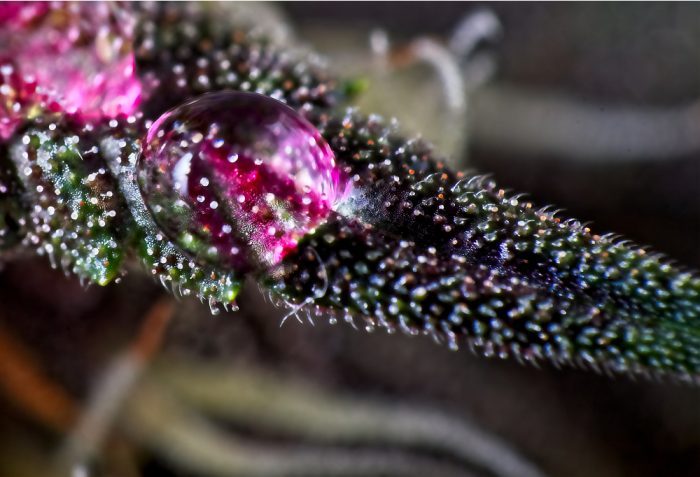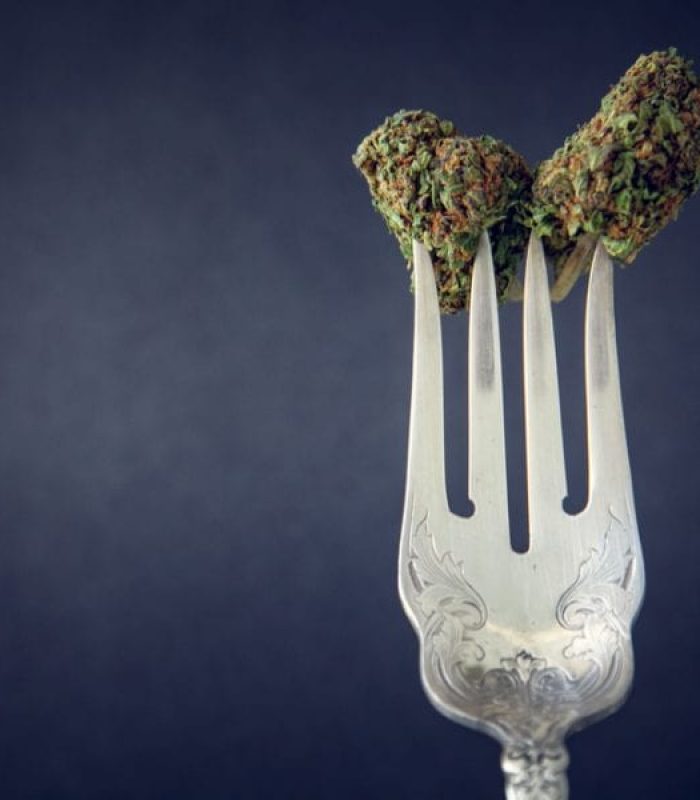Never, never toss a cannabis leaf in the garbage. Here’s why…
When it comes to the cannabis plant, the flower tends to take pride of place. But what about the leaves? Does their purpose end once they’ve soaked up the sun to feed the buds? Well, no, actually. Growers who toss the leaves at the end of the harvest may want to reconsider.
There are two main types of cannabis leaves. And, there are good things to do with each.
Fan Cannabis Leaf
The fan leaf is the broad leaf that has become the iconic image for cannabis. But, this wider and darker leaf is not just a cannabis caricature. These contain most of the converted photosynthetic energy that was captured by the plant. This makes the fan leaf ideal for consumption as it’s packed with nutrients and resin.
Sugar Cannabis Leaf
Less recognized on the cannabis plant is the sugar leaf. This cannabis leaf is smaller in size and is often hidden in the denser areas of the plant, close to the flowers. As well as containing relatively high levels of cannabinoids, sugar leaves can be covered in trichomes. Most cannabis consumers are familiar with trichomes’ in its powdered form at the bottom of the grinder (kief).
Trichomes are resin glands that protect the plant by providing a physical barrier between the more delicate sugar leaves and insects or organisms that could potentially damage it. These also induce a psychotropic effect thanks to high levels of THC. In fact, trichomes tend to be higher in cannabinoid concentration than the average cannabis flower.

A Spoonful of Sugar (Leaves)
One way to make the most out of sugar leaves is to make kief coffee or tea. The cannabinoids in kief need heat to activate, and in order to convert THCa and CBDa into THC and CBD, respectively. Decarboxylating the sugar leaves prior to use will ensure that you access maximal THC content. However, if THCa is the desired cannabinoid, then all that is needed is to grind the leaves.
Since these trichomes are so concentrated, only a small amount is needed (around 1 gram). While this method has largely gained popularity from anecdotal methods and reviews, there is research that suggests that caffeine may actually help to enhance the effects of cannabinoids.
All the Benefits, None of the “High”
Juicing raw fan and sugar leaves can be an effective way of consuming their beneficial active ingredients. Cannabinoids, terpenes, flavonoids, and vitamins, as well as a range of other dietary nutrients all exist in cannabis leaf juice.
Basically, you can use a home juicer, or simply crush the leaves and strain. One other benefit to juicing cannabis leaves is that as it doesn’t require heat.
Perfect for Medibles
For those who do want to decarboxylate the cannabinoids present in cannabis leaves but aren’t wanting to consume it as a beverage, a cannabis leaf oil may be a better solution. By heating cannabis leaves gently in oil (like coconut), some of its components will infuse into the oil. Add this infused, decarboxylated product to food.

Benefits of Cannabis Leaf Components
Now that these components exist in a more consumable form, what effects should we expect from them?
THC
Basically, THC has a range of therapeutic benefits, with studies demonstrating that THC may:
- Reduce pain – THC regulates CB1 receptors found in areas of the brain that regulate pain perception. Moreover, THC has shown an ability to modulate opioid release.
- Reduce nausea – Researchers believe that THC modulates the effects of the 5-HT3 receptor in order to reduce nausea.
- Improve appetite – THC has shown an ability to increase appetite and weight gain through the modulation of the mesolimbic dopaminergic pathway involved in food reward.
CBD
CBD also has a wide range of therapeutic benefits. Some of these may include:
- Reduced pain – Like THC, CBD may be able to provide a form of pain relief. It is thought that this might occur when CBD activates the 5-HT1A serotonin receptor, leading to a cellular cascade and inhibitory response that may reduce pain perception.
- Improved mood and mental health – CBD has shown potential as a mood modulator. One study from 2010 even found that CBD was able to induce antidepressant-like effects that are comparable to pharmacological antidepressants. This may occur by CBD activating the 5-HT1A receptor and increasing serotonin production.
- Improved disease symptoms – Research has shown CBD to exert both neuroprotective and anti-inflammatory properties. This would be crucial for reducing the symptoms of diseases, such as Parkinson’s, Alzheimer’s, and Multiple Sclerosis.
Terpenes
Like cannabinoids, terpenes are active organic compounds found in the cannabis plant that can induce a range of effects. We’ve found over a hundred different terpenes in the cannabis plant. They exist in significantly lower levels than cannabinoids like CBD or THC.

Some of the various terpenes and their effects include:
Myrcene
Limonene
Humulene
Pinene
Linalool
Finally, the next time you go to throw out the trimmings of your cannabis plants, think again. Get the most bang for your buck by using the cannabis leaves to their full potential.



Tim Roll
Medical marijuana has been a “fix all” for me, of course, all the credit due to all the scientists that have done there research, it seems like every week they find a new cure for some disease or sickness, I’ve even heard some cancers are reacting to it, I hope it keeps going
Nellie
How do you keep your leaves for later use? Dri them ? Freeze them fresh?
Tony
I use the entire plant from flower to root ball and everything in between